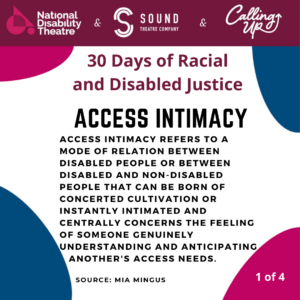ACCESS INTIMACY
Access intimacy refers to a mode of relation between disabled people or between disabled and non-disabled people that can be born of concerted cultivation or instantly intimated and centrally concerns the feeling of someone genuinely understanding and anticipating another’s access needs.
Access Intimacy can refer to:
- when someone “just gets” your access needs
- comfort related to access with a person
- the relaxed feeling itself that comes with having one’s access needs met
Access Intimacy can be built immediately or over years, with someone with shared identities or someone without. It can be strong even with someone who has had no access to disability-related information. It is caring about access issues enough to make a change to the current exclusionary structures we live within.
Source: Coined by Mia Mingus in 2011
Link to Additional Resources
Image Description: Black text on white background with National Disability Theater, Sound Theater, and Calling Up Justice logos.
FURTHER READING
Access Intimacy and Institutional Ableism: Raju Rage on the problem with ‘inclusion’ by Raju Rage
Access Intimacy, Interdependence and Disability Justice
Shifting the Weight of Inaccessibility: Access Intimacy as a Critical Phenomenological Ethos-by Desiree Valentine
https://journals.oregondigital.org/index.php/pjcp/article/view/4781
Access Intimacy: The Missing Link
Mia Mingus on Access Intimacy
Access Intimacy in the Arts: A Conversation with Ezra Benus, Taraneh Fazeli, and Owólabi Aboyade

